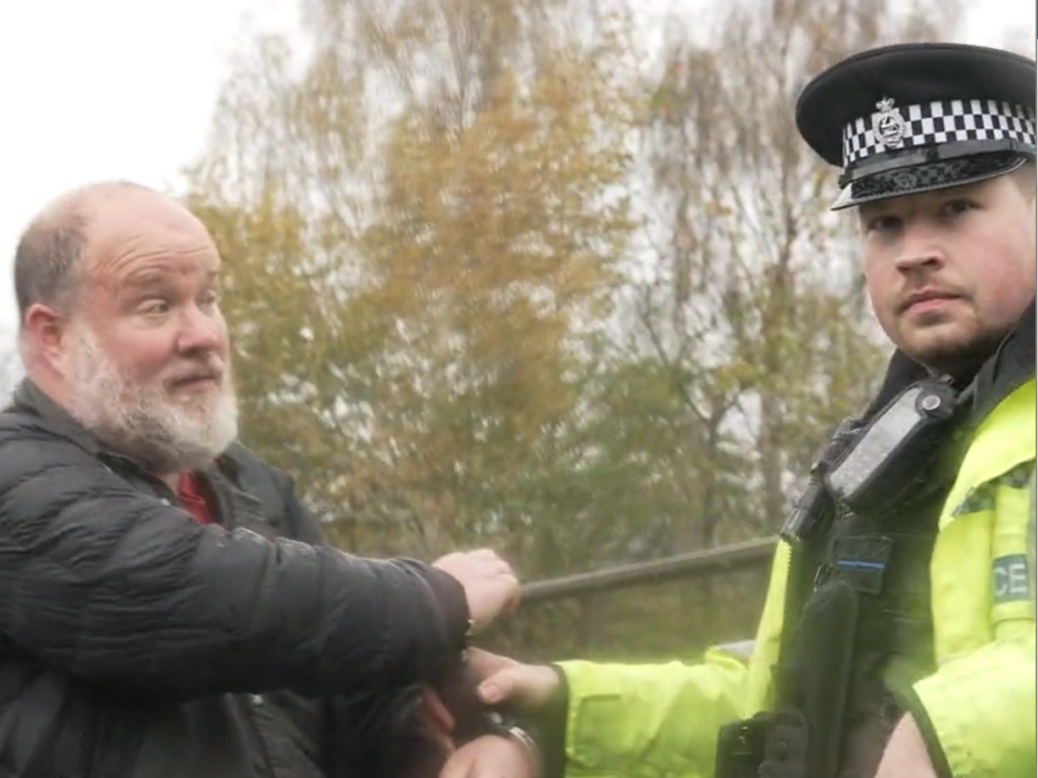
A specific protection for journalists was added to the Government’s anti-protest Public Order Bill by peers on Tuesday.
Peers voted to add a new clause stating that officers may not exercise any police power for the purpose of preventing someone from observing or reporting on a protest or the exercise of police powers in relation to a protest-related offence.
Labour peer Baroness Chakrabarti, who led the amendment alongside Liberal Democrat peer Lord Paddick and crossbencher Lord Hope, said it was “totally uncontroversial” to protect journalists from the “abuse of police power”.
Legal observers, academics and bystanders who observe or report on protests would also be protected by the amendment. The Government opposed the amendment but it was voted for by 283 to 192, a majority of 91.
LBC reporter Charlotte Lynch was present for the House of Lords debate on Tuesday after her arrest on suspicion of conspiracy to commit public nuisance while reporting on a Just Stop Oil protest on the M25 in November. She was held for five hours despite showing her press card.
Her arrest, and that of three other journalists covering the protests including photographer Tom Bowles and documentarian Rich Felgate, may have constituted “unlawful interference” in their freedom of expression, an independent review later found. Campaigners warned that the Public Order Bill could make such arrests “commonplace”.
At the Lords debate on Tuesday, crossbench peer Baroness Boycott compared the treatment of Lynch to that of BBC journalist Ed Lawrence who was arrested and detained in custody while covering protests in Shanghai, China in November.
Boycott, a former editor of The Independent and the Daily Express, said: “Charlotte, like Ed Lawrence was handcuffed for doing her job. She was held in a cell with a bucket for a toilet for five hours; she was fingerprinted and her DNA was taken, and she was not allowed to speak to anyone. Her arrest took place just two weeks before Ed Lawrence’s. Is this the kind of world we want to live in?”
Boycott said the right to protest is a “fundamental right” and that it is a “duty” for journalists to report on them “because demonstrations are where we see where society is fracturing and where people really care.
“I cannot believe, as a former newspaper editor, that I would now have to think that it might be more dangerous to send a journalist to Trafalgar Square than to Tahrir Square [in Cairo, Egypt].”
Similarly, Conservative peer Lord Patten, the last British governor of Hong Kong, said: “It is astonishing that we are proposing in this country the sort of thing which we would denounce if the Chinese Communist Party were doing it in Hong Kong.”
Lord Hope cited Article 10 of the European Convention on Human Rights, which protects the right to freedom of expression.
He added: “It may be suggested that the point being made by the amendment is so obvious that it is unnecessary, but I simply do not believe that.
“In the highly charged atmosphere of the kind of public protest we are contemplating in these proceedings, it is too big a risk to leave this without having it stated in the bill and made part of our law.”
Conservative peer Lord Garnier agreed, adding: “If we are not careful, we will move to preventing the media from creating fair and accurate reports of our courts and even of this place.”
However Lord Hogan-Howe, the former Metropolitan Police commissioner, objected to the amendment, saying that although it is “very obvious” a journalist should not be arrested for doing their job, the bill would mean they could only be challenged for illegal behaviour.
He added: “There is no general defence of being a journalist to any criminal offence. There is protection of legally privileged material, including journalistic material, and the Police and Criminal Evidence Act provides quite proper protection for that.
“However, that is not the same as providing a general defence for criminal behaviour to a journalist. In my view, that is what this proposes.”
Hogan-Howe also said that police may struggle to define the non-journalists covered by the amendment, saying: “An observer, somebody who is monitoring: how are the police to know who these people are? I guess that as soon as a protester is challenged, they might decide that they are a monitor, an observer or any of the groups that might be protected.”
He added: “Journalists complain that many people now claim to be journalists but are merely reporting online. Is that group included in this definition as well?”
The Green Party‘s Baroness Jones, whose daughter is a journalist, pointed out in response that accredited journalists have press cards. She also said: “I do not see why anyone here would have a problem with it, except the Government. What are they frightened of? What do they think journalists will report that would look so bad for them? Obviously, almost anything.”
The peers also debated whether it was necessary to introduce legislation covering something that is already unlawful, but as Lord Paddick put it: “…the fact is that Charlotte Lynch was taken out of the game for five hours and detained in a police cell, where she could not observe what was going on. We need upfront protection for journalists and observers, and not to rely on a defence that they can put after they have been handcuffed, arrested, and put in a police cell even though they are in possession of a police-accredited press pass.”
The bill, with the new amendment, will now return to the House of Commons. Lynch said following the debate: “It’s vital journalists are not deliberately prevented from reporting on legit protects. We don’t get to decide the facts, our job is just to give them to you. I hope this amendment continues to receive support.”
Email pged@pressgazette.co.uk to point out mistakes, provide story tips or send in a letter for publication on our "Letters Page" blog
